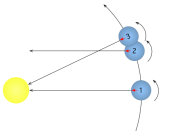Ancient Greek cosmology postulated Earth as the static centre of a Universe rotating around it, citing as evidence, the fact that the stars appear to move around the skies. This model held true from the time of Homer and Hesiod, through Aristotle, right into the 17th Century when Galileo and the invention of the telescope helped prove definitively that this was not the case.
Philolaus (500BC) and Copernicus (AD1543) had both previously introduced alternative systems which require the Earth to be in motion but, at the time, neither was accepted as true. Copernicus had suggested that the Earth rotates in an eastwards direction while simultaneously orbiting the Sun. However, it was believed at the time, that the Earth could not be rotating; otherwise an object dropped from a tower would land to the west of the tower, in accordance with Aristotelian laws of motion.
It was not until Foucault's pendulum experiment in 1851 that the incontrovertible proof of the rotation of the Earth was obtained.
In this experiment a 28kg spherical mass was suspended on a long wire from the ceiling of the Pantheon in Paris. The pendulum was set in motion swinging in one particular direction. A magnetic device centred in the floor beneath it acts upon a cylinder inside the spherical mass, assuring continual motion (it compensates for friction and air resistance thus allowing perfect manifestation of the law of the pendulum).
If we imagine that the tip of the pendulum traced a path in a layer of damp sand on the floor of the Pantheon, we may fall victim to the illusion
that the Pendulum's plane of oscillation has moved full circle... in thirty two hours, describing an ellipse that rotates around its centre at a speed proportionate to the
sine of its latitude
(Umberto Eco, Foucault's...


